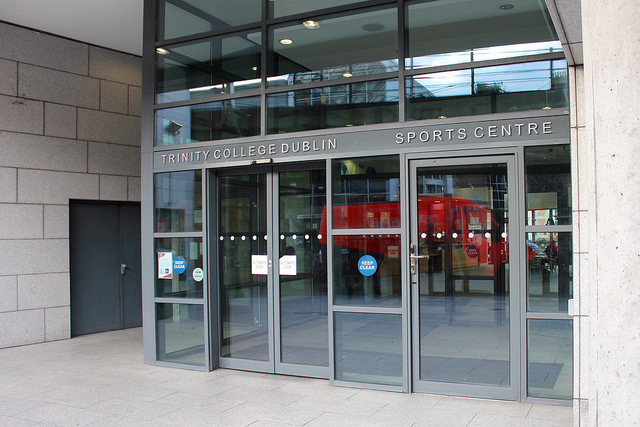Trinity College Dublin Students’ Union (TCDSU) is set to hold a Long Term Policy (LTP) referendum on January 30th regarding the sports levy and its impact on the student body.
The amendment set to be voted upon is centred around the proposal that the TCDSU will support the collection of the Sports Centre Development Charge (SCDC), paid by registered students at the start of the year, provided that the sports centre stops charging booking fees and equipment charges.
While TCDSU has no direct say in how the additional fees are administered, according to its constitution it does support the continued collection of the annual sports charge.
A number of organisations such as The PhDs’ Collective Action Union (PCAU), Students4Change and the Postgraduate Workers Alliance of Ireland (PGWA) have endorsed the “yes” vote.
In a press release sent out on January 19th on the referendum, “yes” campaign manager and co-author of the motion Lórien MacEnulty, a PhD Physics researcher, said: “The booking and equipment fees charged by the college have gotten out of hand. They do not even contribute enough to [Trinity Sports Centre] income to be reported, and squeezing the last pennies from students looking to keep healthy and active is considered part of the [Trinity Sports Centre] business model”.
“Why didn’t Trinity Sport pressure Trinity College harder for more funding before laying the financial burden on the students? Voting “yes” in the upcoming referendum sends a message to [Trinity Sports Centre] and TCD alike: you may no longer exploit the statistically poorest of your stakeholders, the students”, she continued.
“College must use its extra cash to subsidise the financial burden that currently weighs heavily on our strained sports services.”
In the same press release, Chairperson of Students4Change and seconder of the motion at Council László Molnárfi said: “Students are struggling with the cost-of-living crisis and the housing crisis. Over 11,000 of us are in rent or fee debt to our third-level institutions across Ireland, more than 250 of us at Trinity College Dublin”.
“Our College is complicit in this, by commercialising student life”, he continued. “College’s various charges to access sport facilities quickly add up to become a financial burden, meaning that many of us cannot afford to socialise. This means that students get disengaged and the community is hurt, not the least by increasing the risk of dropping out of College.”
“I urge everyone to vote “yes” in the upcoming referendum. Instead of squeezing every last cent out of students by commercialising all aspects of the student experience, Trinity should realise that supporting this model of funding is unsustainable, hurtful to our community and a dereliction of duty.”
Chairperson of Trinity Sport Liam Bean also released a statement on Twitter regarding the referendum. “The proposed amendments to cease booking fees and equipment charges for sports facilities and classes threatens the student sport experience and opportunities, and will inevitably result in less access and capacity for student support, higher charges to student sports clubs and an increase of commercial activity”.
“The proposed wording in the sport levy referendum includes inaccuracies in relation to the inflation provision and there has been no consultation on the sports levy referendum with Trinity Sport Union”, he continued.
“Ultimately, I believe this vote is flawed. Make sure to register as soon as possible and vote “NO” to safeguard student sport at Trinity. If you have any questions on the vote please reach out to me or a member of the executive”, he finished.
MacEnulty later issued a statement on Twitter responding to Bean’s comments: “The content of Trinity Sports Union’s statement is pure, unsubstantiated speculation and belies a deep misunderstanding of the LTP motion under referendum”.
Adding more context to the reason behind the referendum, she mentioned that “students currently pay from the total contribution charge a sum of €120 called the Sports Development Charge (SDC), which contributes massively to Trinity Sport (TS) income”.
“The only body with the power to enforce collection and distribution of student fees is the Capitations Committee (CC). The [TCDSU] has only one of many seats on this committee. So, if the SU decides it no longer supports the collection of the SDC, it will announce this to the CC, and then the committee members will… talk about it. That’s it. Just talk”, she continued.
“The result of the referendum, therefore, WILL NOT directly translate into a functioning boycott against the SDC. The result of the referendum WILL serve as testament to the will of students.”
“By advocating for a ‘no’ vote, the Trinity Sports Union (TSU) is actually shooting itself in the foot”, she said. “Sports clubs and societies also pay inordinate amounts of money in booking fees to TS. They’re worried that this reevaluation of how TS is funded would somehow ‘result in them being charged for facilities to make up the shortfall’.”
“By saying this, they’re trying to make assertions as to how TS would respond to financial crisis, which is an immensely speculative undertaking at best, and anyway, an irrelevant inquiry. This referendum is NOT going to put TS in any sort of financial crisis.”
“When the time comes to discuss how TS is funded, the role of TSU will be to take a similar stance to that of the SU: College must subsidise the financial burden that weighs heavily on our strained sports centre, not the students and not the clubs they comprise”, she finished.
This article was updated on January 29th to include a statement from Lórien MacEnulty in response to the Trinity Sports Union.







